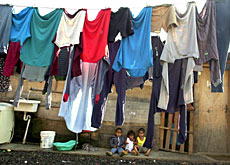Swiss seek long-term solution to poor world debt

Swiss ministers attending this weekend’s IMF and World Bank meetings will be supporting calls for a reduction in the debt burden of the world’s poorest countries.
But the government says American proposals to completely cancel debts would not solve the problems faced by these countries.
The Swiss are backing a British plan to cancel poor countries’ debt, but insist that any arrangement must be agreed within the framework of the Bretton Woods institutions, which include the International Monetary Fund and the World Bank.
“Switzerland welcomes the British initiative, but all measures have to be negotiated within… Bretton Woods,” said Martin Lanz of the Swiss finance ministry.
His boss, finance minister, Hans-Rudolf Merz, and the economics minister, Joseph Deiss, will be representing Switzerland at the Bretton Woods meeting in Washington on Saturday.
Ahead of the meeting, the British chancellor, Gordon Brown, proposed that all poor country debt be scrapped, and that rich nations foot the bill. The United States, by contrast, wants the World Bank to cover the cost of debt cancellation from its existing budget.
Credibility
“The credibility and the capacity of the Bretton Woods institutions would be seriously affected [if they had to fund the debt cancellation out of their own budgets],” said Lanz.
“The Swiss government firmly supports the debt relief programme for the poorest countries, launched by the IMF and World Bank in 1996,” he added.
That initiative targets the world’s most “highly indebted poor countries” (HIPCs), which include about 40 nations, mostly in Africa. The IMF member states said on Thursday that the programme should be extended for two years.
But the United Nations Conference on Trade and Development (UNCTAD) has argued that the programme is unlikely to achieve its purpose of wiping out the HIPCs’ debt.
“Between 1970 and 2002, Africa received $540 billion in loans,” said UNCTAD. “In the meantime, $550 billion – in interest and loan repayments – has been paid back.
“[But] at the end of 2002, debts in Africa amounted to almost $300 billion. In other words, indebtedness of poor countries will not be solved in the near future.”
“Success”
The Swiss position is that, while the initiative has not eliminated all debt, it can be seen as a “success”.
“Before it was put into practice, poor countries spent globally 30 per cent of their budget on interest payments for their debts,” said Martin Lanz. “The rate is now down to 11 per cent.”
And experts warn that simply cancelling poor country debt will not solve the problem of indebtedness.
“These countries will not be able to do without new loans,” says Pauline Plagnat, a specialist in economic development at the Geneva Institute of Development Studies.
The Swiss approach has been to stop lending money to poor countries, and instead provide them with grants, which do not have to be paid back.
Switzerland will also be reminding other IMF members that it was one of the first countries to ease the debt burden on poor nations to tune of SFr500 million since 1991.
swissinfo
The finance and economics ministers, Hand-Rudolf Merz and Joseph Deiss will represent Switzerland at the IMF and World Bank meetings in Washington.
Switzerland has contributed SFr500 million to poor countries’ debt relief since 1991.
It also contributed SFr200 million to the IMF and World Bank’s debt relief programme.
Switzerland has been a member of the IMF and World Bank since 1992.
It represents seven countries at those institutions– Poland, Serbia and Montenegro, Azerbaijan, Kyrgyzstan, Uzbekistan, Tajikistan and Turkmenistan.
Switzerland is one of 24 members on the board of the IMF and the World Bank.

In compliance with the JTI standards
More: SWI swissinfo.ch certified by the Journalism Trust Initiative











You can find an overview of ongoing debates with our journalists here . Please join us!
If you want to start a conversation about a topic raised in this article or want to report factual errors, email us at english@swissinfo.ch.